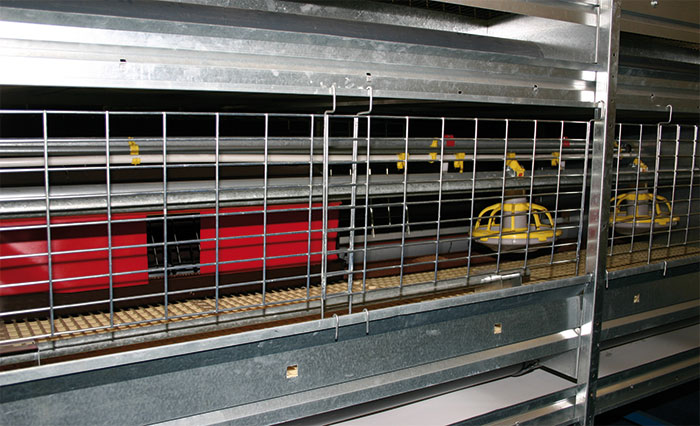
A farm in Taiwan has reportedly converted to European Union standard enriched cages. The farm, which has gained accreditation for its enriched cage production from the Taiwan Society of Agricultural Standards and from SGS International Certification, has become the first egg production unit in Asia to introduce the higher welfare standard and is ahead of many units in Italy and Greece, where an estimated 20 million laying hens are still being housed in breach of the EU's ban on conventional cages.
Some people in the United Kingdom egg industry believe that eggs produced in Taiwan present no threat to the domestic shell egg market because of the distance over which the eggs would have to be transported, but Barry Jackson of Eggsell believes that Europe should take the development seriously.
"Back in the 1960s the colleague I replaced at the Central Egg Agency was regularly bringing egg in from South Africa. This needs to be thought about very seriously because the food industry is facing some very big challenges. I suspect egg produced over there would benefit from Government subsidies to break into Western markets. It has to be taken seriously."
Last September at the International Egg Commission (IEC) conference in London, former Tesco chief Sir Terry Leahy raised the prospect of a global market in eggs. Whilst many people dismiss the idea of shell eggs being shipped around the globe, the development in Taiwan may well be an indication that there is some substance in what the ex Tesco boss was saying.
"Food is still very local," he said. "The way we buy food is still on a local basis. Most of the purchasing decisions in our Chinese business will be made by the buyers based in Shanghai, indeed actually in China, for example, there is more regional buying even than national buying. But we have now created central teams for food in the way that we have central sourcing teams for things like clothing and general merchandise. So there is a team that is looking around the world for the best producer of a given product, the best factory, the best season, the best farmer, and we are seeing how we can improve the logistics to get that best source to the market."
He said, "There are lots of barriers, of course. You have got different regulations for food - it's not always a market that you can transfer product across - but that thinking is beginning, so you should be aware of that and you should be aware of the potential and significance for your industry. Poultry, as you know, is already a globally sourced market. Eggs is still more domestic, more national, but that, too, I think will change."
Barry Jackson pointed to the success of Asia in penetrating the chicken meat markets of the West. "There is a huge trade in chicken meat, both fresh and frozen, and a lot of it comes from the Far East." He said it would be a little complacent to think that a farm in Taiwan introducing EU egg production standards would not seek to export its eggs to Europe. "They would be very interested to see the margins they could make by exporting. This news from Taiwan doesn't surprise me, but it would concern me," said Barry.
Delegates at the London IEC conference in September were told that three North African countries - Morocco, Tunisia and Algeria - were looking to introduce enriched cage systems in order to be able to export shell eggs to the EU. The same was happening in some South American countries, as well as in Belarus and Ukraine, they were told. A Turkish delegate at the conference said that his country hoped to be enriched by 2015, opening up the possibility of shell eggs from producers in Turkey being shipped to states in the European Union.
News that a farm in Taiwan had achieved enriched standard was reported by the country's national news agency. The farm, which is in Kaohsiung City in southern Taiwan, has reportedly invested the equivalent of 33 million US dollars in upgrading its facilities. The farm currently houses 120,000 hens, producing 100,000 eggs per day. More enriched cage production is yet to come on stream at the unit. Once the investment is completed the farm will house 500,000 birds.
As well as complying with the EU's enriched housing standard - the directive requires at least 750 square centimetres of cage area, a nest-box, litter, perches and claw-shortening devices - the Taiwanese farm has also incorporated a number of other measures from the West. "Zero-pollution production equipment from Europe and the US" has been introduced and the farm is using extensive automation.
The farm has abandoned the induction of molting in hens to improve production and it does not use drugs to increase egg productivity. Only eggs laid by 25 to 80-week old hens are sold as fresh eggs. The farm says that the use of ginseng, lingzhi mushrooms and natto (a type of Japanese fermented soybean) in the diet improves hen health and egg quality.
The country's Agriculture Minister, Chen Bao-ji, was quoted as saying that the farm's achievement marked an important milestone in Taiwan's quest to upgrade its egg production methods for the well being of egg-laying hens. "More countries are expected to follow suit in the years ahead and our livestock industry needs to catch up with this trend," he said.
Barry Jackson said that the Taiwanese were probably trying to get ahead of world trade. The growth in the world's population and the question of food security were becoming huge issues. Eggs were an important source of protein and they were a worldwide product.
